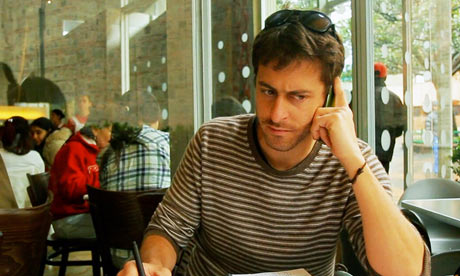By Heba Girgis
Impunity Watch Reporter, South America
BOGOTA, Columbia–Colombia’s guerilla group FARC (Fuerzas Armadas Revolucionarias de Colombia), the Revolutionary Armed Forces of Colombia, recently decided to free a French reporter, Romeo Langlois, who they kidnapped on April 28. A Red Cross official received a statement from the FARC group declaring Langlois’ release for Wednesday, May 30.

Langlois, 35, was kidnapped during a shootout with Colombian troops carrying out an anti-drug raid in the southern rebel stronghold of Caqueta. The Red Cross received a statement from FARC assuring that despite a minor wound in his left arm, Langlois is in good health. FARC has been using kidnapping as a means of extortion to pressure the government into relinquishing money and political control.
FARC began in the 1960s as a Marxist movement but has developed into what the EU and the United States have labeled “a terrorist group” after the group’s involvement in kidnapping, extortion and drug trafficking.
The Colombian military has been targeting numerous high-ranking leaders of the FARC. The military has recently been saddled with the task of tracking down Alfonso Cano, FARC’s newest leader, after being successful in killing secretariat members of the group, Raul Hayes and Jorge Briceno.
In order to accomplish this goal, the military’s strategy has been to flood the region with ground troops to establish control over the territory. According to Lieutenant-Colonel Rodolfo Mantilla, commander of a Colombian battalion, this has proven to be a difficult endeavor because of the physical characteristics of the country. Mantilla explained, “Our troops can only move one or two kilometers a day because of the steep canyons and the landmines planted by the guerrillas. It is also difficult because it only takes one civilian to tell the FARC where our troops are and we can be easily ambushed.”
The Colombian military continues to work with the United States’ sponsored crackdown against FARC, however the group is still in control of remote jungle areas and has been carrying out attacks on oil and mining projects in the past few months.
Colombian President Juan Manuel Sanchez has repeatedly demanded that Langlois be freed, while his minister of defense urged against negotiating with these “terrorists.” In February, FARC said it would stop taking hostages to pay for weapons, uniforms, and food. However, the group made no promises to stop taking hostages to pressure the government or make political statements.
For further information, please see:
CNN–Colombia’s FARC Rebels to Release French Journalist, Statement Says–27 May 2012
Colombia Reports–FARC Plans to Free French Journalist Wednesday–27 May 2012
The Telegraph–FARC to Release French Journalist on Wednesday–27 May 2012
Colombia Journal–The Hunt for FARC Commander Alfonso Cano–17 January 2011
RIA Novosti–Colombian Rebels “Agree” to Release French Reporter–14 May 2012



